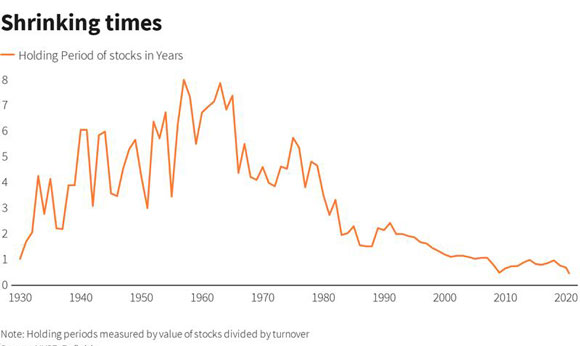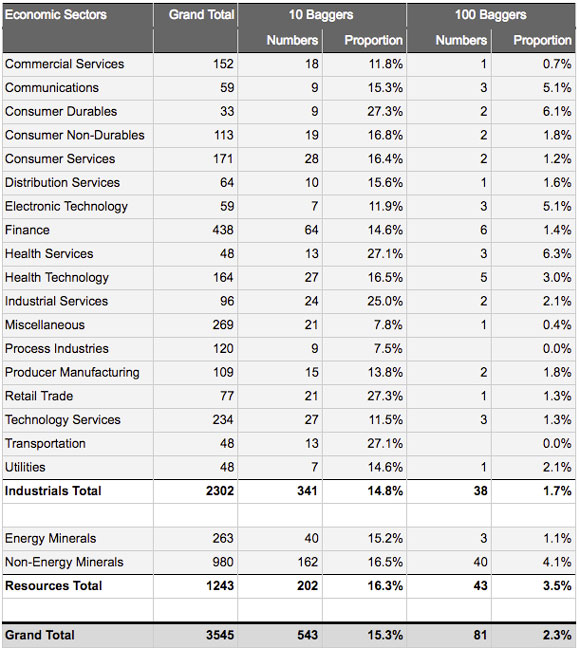Can you really find 100-bagger stocks?
100 baggers are stocks that return $100 for every $1 invested.
Finding a 100-bagger can bring life-changing gains.
Obviously.
An initial $10,000 transforming into $1 million will overhaul one’s lifestyle.
But how do you find 100-bagger stocks?
In investing, the ‘how’ is the hardest question. A bastardised Aesop’s fable shows why.
A grasshopper approaches a colony of ants, seeking advice on lodgings for the coming winter.
‘Friends, you’ve got a house and provisions for the winter. I don’t, and I’m getting worried. What should I do?’
‘Easy. Change into a cockroach and find yourself a house where you’ll find food and warmth.’
Relieved, the grasshopper thanked the ants and was about to walk away when he asked, ‘Oh, how do I change myself into a cockroach?’
One of the ants waved him off, ‘We’ve given you the master plan. It’s up to you to work out the details.’
This remixed fable comes from Thomas Phelps’s 100 to 1 In the Stock Market, the first book on 100-bagger stocks.
Phelps’s point was clear.
It’s one thing to know you should buy quality businesses and hold on.
Executing this is harder.
Is there a magic formula?
Is there a magic formula to 100-bagger stocks?
Betteridge’s law of headlines (or subheadlines) suggests no.
Chris Mayer agrees.
Mayer is the author of 100 Baggers, an updated study on stocks rising 100-fold.
Mayer ended his book by saying ‘there is no magic formula for producing 100-baggers’.
No easy screen for them exists.
You can’t log in to a market screener and filter for ‘100-bagger stocks’.
And if you could, you’re getting scammed and you should change your passwords.
While we lack a magic formula, we have rough lineaments of what a 100-bagger looks like.
The four characteristics of 100-bagger stocks
Unsurprisingly, there’s been plenty of research conducted on stocks gaining 100-fold or more.
Through the years, common traits have been identified.
In The Stock Market’s Greatest Winners, Christopher Kjaer Hansen and Daniel Dyhr Schjunk summarised four characteristics of 100-bagger stocks commonly popping up in the literature.
Relative strength
The biggest stock winners appreciate at a higher pace than the market. This makes sense because often these stocks operate at the frontiers of new markets, where growth is accelerating, not maturing.
Researchers Morales and Kacher put it this way:
‘[100-baggers] represent the leading edge of what is happening in the economy with respect to the new industries, new economic developments, and other themes that serve as essential drivers for the economy at any given point in time.’
You can’t be a 100-bagger if you’re growing as fast (or as slow) as the wider market and economy.
New high prices
Counter-intuitively, some studies have found a ‘high-altitude paradox’ where what seems too expensive and risky ends up higher eventually, and what seems cheap tends to get cheaper.
Hansen and Schjunk cited research that found stocks trading close to their 52-week highs had ‘better subsequent returns than stocks with prices far from the 52-week high’.
Personally, I am doubtful of this factor’s usefulness.
I abstain from deriving value from price.
But new high prices may be a good indicator after deep qualitative research on a 100-bagger candidate.
Growth
Undoubtedly, you cannot become a 100-bagger stock without years of strong growth. And as the relative strength factor implies, this growth has to be above average.
Interestingly, studies suggest earnings acceleration matters more than simply earnings growth.
As one study put it:
‘Primary consideration should be given to whether the rate of change in earnings is substantially increasing or decreasing.’
Profitability
You can’t have a 100-bagger stock without high return on investment.
One study showed that nearly all the greatest growth stocks of the past 50 years had return on equity (ROE) of at least 17%.
The very best stocks have ROEs between 25–50%.
And that’s because the very best stocks have enduring competitive advantages that allow them to grow and fend off competitors.
100-bagger stocks are enduring businesses.
Most take about 20–25 years to become what they are.
In those intervening years, they must maintain outstanding performance. A high ROE is an indicator of a competitive advantage that allows this outstanding performance to endure.
As McKinsey’s Tim Koller put it:
‘High-performing companies are in general remarkably capable of sustaining a competitive advantage in their businesses and/or finding new business where they continue or rebuild such advantages.’
Do you have the patience, never mind the guts?
100-baggers take decades to become 100-baggers. So a major part of investing in these stocks is patience.
Mayer said if you’re hunting for 100-baggers, ‘you must learn to sit on your ass. Buy right and sit tight’.
But how well can you sit on your ass? And for how long?
Consider a hypothetical where you have a concentrated portfolio of five stocks, each destined to be a 100-bagger in 30 years.
What do you do in the interim?
Can you really rest on your laurels for three decades? Can you resist the urge to sell early? Or sell stakes to invest in riskier ventures?
Will you fancy other stocks and jilt one of the original five?
The average holding period for stocks is shrinking and has done so for decades.
A Reuters calculation found the average holding period for US shares in 2020 was 5.5 months.
The holding period is no longer measured in years.
You can’t get 100-baggers that way.

As Phelps said in his 100 to 1 In the Stock Market:
‘Thousands of investors have owned one or another of these [100 baggers] at sometime or other in the last forty years. Probably not one in a thousand has held his winner until it increased one hundredfold in value.’
Patience is the key, but patience often eludes us.
ASX 100-bagger stocks
Are there any 100-bagger stocks on the ASX?
Yes.
In 2018, MX Capital ran a study on all stocks ever listed in Australia and New Zealand over the then last 35 years.
Using a FactSet database, MX Capital found all the stocks that rose 10-fold and 100-fold in that time, itemising by sector.
Here’s the chart.

Out of 3,545 stocks surveyed, 81 were 100-baggers.
That’s about 2%.
Of all the stocks ever listed in Australia and New Zealand between 1983 and 2018, only 2% rose 100-fold.
Chasing unicorns is hard, especially when most of them are donkeys.
That said, about 15% of the stocks ended up as 10-baggers or more. Not nearly as lucrative, not nearly as elusive, either.
MX Capital didn’t disclose the names of all eighty-one 100-baggers, but it did highlight the most well-known ones:
- Realestate.com.au
- ARB
- CSL
- TPG Telecom
How many of you have held either of those stocks?
And for how long?
3 topics
4 stocks mentioned
.png)
.png)